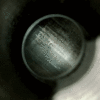Smaug
Member
To the guys who are saying "just clean your gun and it's not a problem", have you found that regular old powder solvent is enough, if cleaning is regular?
One member posted earlier that he coats his guns in 50% engine oil and 50% 3-in-1 oil, reasoning that if it can keep carbon from building up inside engines, it will work OK on guns too. I was thinking about that, and the parts of the engine that are lubricated are not the parts that have combustion to deal with. (unless you have leaky piston rings!) If he hasn't had problems with carbon build-up, it's not because of his oil mixture, but because he does a good job cleaning the gun.
What would make more sense would be either fuel injector cleaner or whatever the use to clean the valves. That might be worth a try!
One member posted earlier that he coats his guns in 50% engine oil and 50% 3-in-1 oil, reasoning that if it can keep carbon from building up inside engines, it will work OK on guns too. I was thinking about that, and the parts of the engine that are lubricated are not the parts that have combustion to deal with. (unless you have leaky piston rings!) If he hasn't had problems with carbon build-up, it's not because of his oil mixture, but because he does a good job cleaning the gun.
What would make more sense would be either fuel injector cleaner or whatever the use to clean the valves. That might be worth a try!






